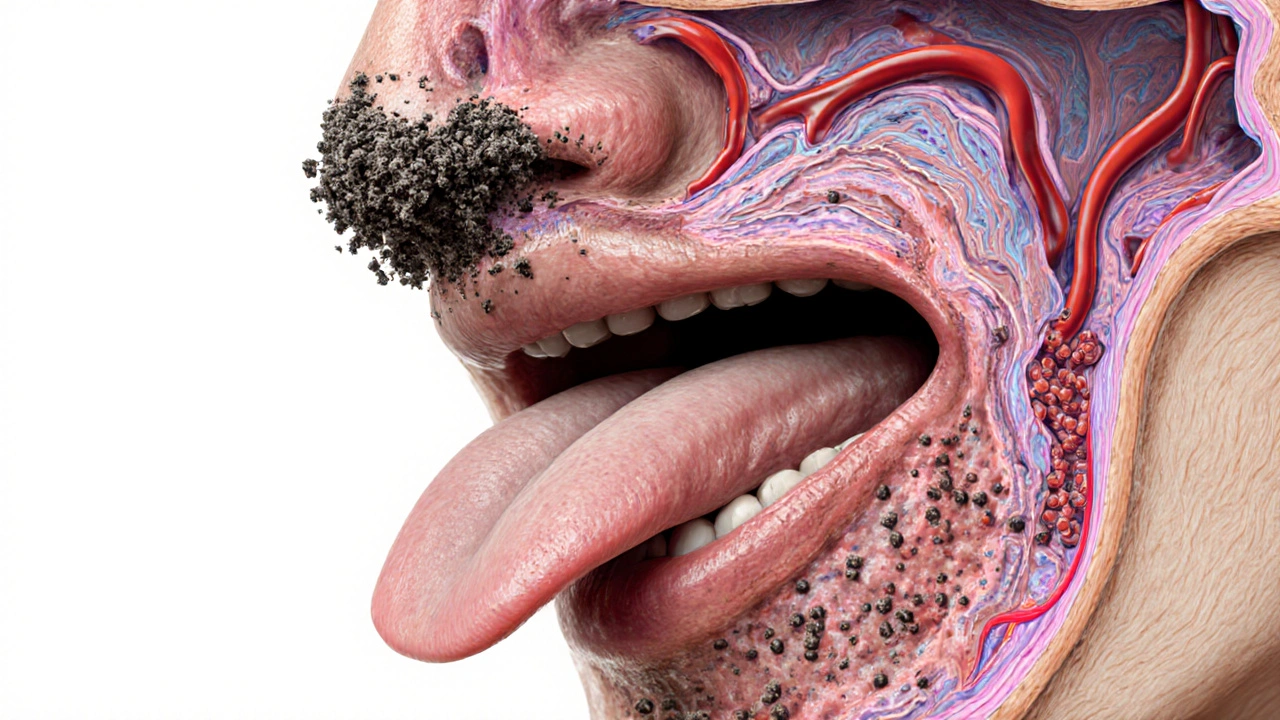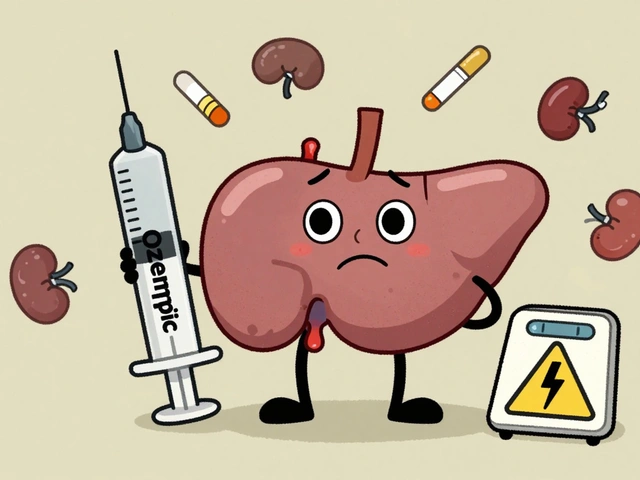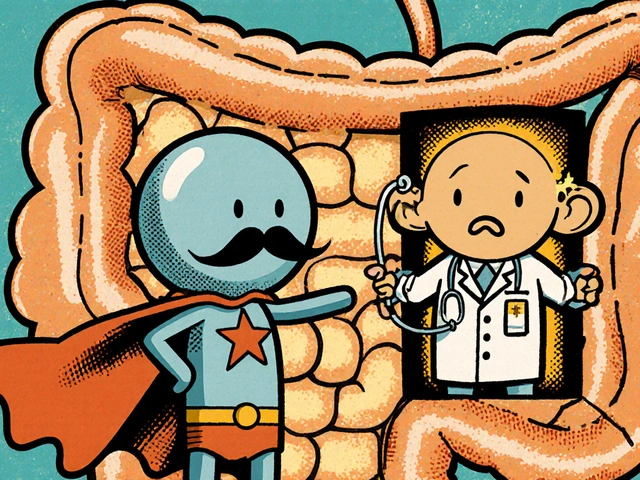Taste & Smell Recovery Estimator
How Long Until You Regain Your Senses?
Enter your smoking history to estimate recovery time for taste and smell. Based on research from the National Institute on Drug Abuse and Journal of Otolaryngology.
Recovery Estimate
- 2-4 weeks: Initial taste improvement
- 2-3 months: Cilia recovery begins
- 6-12 months: Taste buds fully regenerate
- 3-24 months: Smell senses normalize
Tip: Recovery speed increases significantly when you:
- Hydrate daily (2L water)
- Practice nasal saline rinses
- Avoid secondhand smoke
Why This Matters
Smoking damages taste buds and olfactory receptors through three pathways: tar coating, reduced blood flow, and neurotransmitter disruption. Your recovery timeline depends on how long you smoked and how many cigarettes per day. Most short-term smokers (under 5 years) notice significant improvement within 2 months, while long-term smokers (10+ years) may take up to 2 years to regain full sensory function.
Key fact: Flavor perception is 80% smell. When smell recovery lags behind taste, food may still seem bland even when taste buds have improved.
Ever notice that a cigarette seems to dull the flavors of your morning coffee or the aroma of fresh‑baked bread? That’s not just imagination-smoking actively erodes the very senses that let you enjoy food, fragrance, and even safety cues in the environment.
Key Takeaways
- Smoking introduces chemicals that damage taste buds and olfactory receptors within weeks.
- Nicotine, tar, and carbon monoxide each play distinct roles in reducing taste and smell acuity.
- Loss of smell often precedes noticeable taste decline because the two senses are tightly linked.
- Most sensory damage is partially reversible after quitting, but recovery time varies from months to years.
- Supportive habits-hydration, oral hygiene, and airway clearing-speed up the healing process.
When you light a cigarette, smoking is the inhalation of tobacco smoke, delivering nicotine and thousands of chemicals into the lungs and bloodstream. Those chemicals travel straight to the mouth and nose, where they begin to sabotage the tiny sensory cells that translate flavor and fragrance into brain signals.
Why Taste Takes a Hit
The tongue’s surface is covered with taste buds clusters of receptor cells that detect sweet, salty, sour, bitter, and umami flavors. Smoking harms them in three major ways:
- Chemical assault: Tar particles coat the tongue, physically blocking taste receptors and reducing their responsiveness.
- Reduced blood flow: Nicotine causes vasoconstriction. With nicotine an alkaloid that stimulates the nervous system and narrows blood vessels, fewer nutrients reach taste buds, slowing regeneration.
- Neurotransmitter disruption: Smoking alters dopamine and serotonin levels, which modulate how the brain perceives taste intensity.
Within just two weeks of daily smoking, many people report a dulled perception of sweetness and saltiness. Studies from the National Institute on Drug Abuse show a 30‑40% reduction in taste sensitivity among regular smokers compared to non‑smokers.
How Smell Gets Compromised
Smell relies on the delicate olfactory epithelium at the top of the nasal cavity. This tissue contains olfactory receptors specialized neurons that bind odor molecules and send signals to the brain’s olfactory bulb. Smoking attacks this system in several layers:
- Chemical irritation: Tar and other particulate matter embed in the mucous layer, causing inflammation that swells the epithelium.
- Damage to cilia: cilia microscopic hair‑like structures that move mucus and trapped particles out of the nasal passages become paralyzed or break off, preventing the clearance of odors.
- Carbon monoxide toxicity: carbon monoxide a colorless gas that binds to hemoglobin more readily than oxygen reduces oxygen delivery to the olfactory neurons, leading to cell death.
The result is a gradual but noticeable decline in the ability to detect everyday smells-think coffee, gasoline, or even a “gas leak” warning. Research published in the Journal of Otolaryngology indicates that 70% of long‑term smokers experience measurable smell loss after five years.

Timeline of Sensory Decline
| Sense | Typical Onset | Primary Mechanism | Recovery Potential |
|---|---|---|---|
| Taste | 2-4 weeks | Tar coating & nicotine‑induced vasoconstriction | Moderate - 6‑12 months after quitting |
| Smell | 1-3 months | Cilia damage & olfactory receptor inflammation | High - 3‑24 months, depends on smoking history |
Notice that smell often lags behind taste because the nasal epithelium repairs more slowly. However, the two senses are interlinked; a diminished sense of smell automatically reduces flavor perception, since flavor is 80% smell.
Warning Signs You’re Losing Your Senses
- Food tastes “bland” even when heavily seasoned.
- You need to turn up the volume of food‑related conversations to notice descriptions.
- Strong odors (like perfume or smoke) feel faint or go unnoticed.
- Difficulty detecting spoiled food, which can pose a safety risk.
- Frequent cravings for sugary or salty foods as the brain tries to compensate for reduced taste feedback.
If any of these symptoms appear and you smoke regularly, it’s likely your senses are under attack.
Can You Get Your Taste and Smell Back?
The good news: smoking taste loss is not always permanent. The body has a remarkable ability to heal once the source of damage is removed.
Short‑term smokers (under 5 years) often notice improvement within weeks of quitting. Taste buds regenerate fully in about 10‑14 days, while cilia begin to recover in 2‑3 months.
Long‑term heavy smokers (10+ years) may face a slower bounce‑back. Some olfactory neurons can be lost permanently, but most patients regain at least 70% of baseline function with sustained abstinence and supportive care.
Key factors that accelerate recovery:
- Complete cessation-any smoking “light” or “social” use continues to expose the receptors to harmful chemicals.
- Hydration-water helps flush out residual tar and keeps mucous membranes moist.
- Oral hygiene-regular brushing, flossing, and using a tongue scraper removes coated particles.
- Airway clearance-steam inhalation or saline nasal rinses restore ciliary motion.
- Nutrition-vitamins A, C, and zinc support epithelial repair.

Practical Steps to Protect and Restore Your Senses
- Quit smoking using evidence‑based methods (nicotine replacement, counseling, prescription meds).
- Stay hydrated-aim for at least 2L of water daily.
- Practice oral care-brush twice daily, floss, and consider a gentle tongue scraper.
- Use nasal saline sprays or perform a daily neti pot rinse to clear the nasal passages.
- Introduce flavor‑rich foods-spicy, sour, or umami dishes stimulate remaining taste receptors.
- Seek professional evaluation if loss persists beyond six months; an ENT specialist can assess olfactory nerve health.
Bottom Line
Smoking isn’t just a lung problem; it silently robs you of the pleasures that come from taste and smell. The chemical cocktail in cigarette smoke attacks taste buds, olfactory receptors, and the supporting structures that keep them functional. While the damage can be significant, quitting gives your body a chance to rebuild-often faster than you expect. By taking proactive steps now, you can restore enjoyment of food, fragrance, and safety cues, and reclaim a richer sensory life.
Frequently Asked Questions
How quickly do taste buds recover after I quit smoking?
Taste buds fully regenerate roughly every 10‑14 days. Most former smokers notice a noticeable sweetening of foods within 2‑4 weeks, provided they avoid any tobacco exposure and maintain good oral hygiene.
Can a nicotine patch still affect my sense of smell?
Nicotine patches deliver nicotine systemically, so they can still cause mild vasoconstriction. However, the dose is much lower than smoking, and most users report little to no impact on smell once they have quit cigarettes.
Is there any medication that can speed up olfactory recovery?
Some otolaryngologists prescribe short courses of oral steroids to reduce inflammation, but evidence is mixed. Most improvement comes from eliminating smoke exposure and using saline rinses to keep the nasal lining healthy.
Why do I still crave cigarettes even after my senses improve?
Cravings are driven largely by nicotine addiction in the brain, not by taste or smell. Supporting your quit attempt with counseling, nicotine replacement, or prescription meds addresses this psychological component.
Will my sense of smell ever be as good as before?
For many people, especially those with a smoking history under 10 years, smell can return to near‑baseline within 12‑24 months of quitting. Heavy, long‑term smokers may retain a modest deficit, but even a 30‑40% improvement dramatically enhances quality of life.






Comments
You can actually feel the slow erosion of flavor as you keep lighting up day after day and the chemicals in smoke settle like a gray film over the delicate buds on your tongue and the tiny hairs inside your nose that catch scents they are literally being starved of oxygen and nutrients as nicotine constricts blood vessels and the tar builds up like a stubborn varnish that you cannot brush off it takes weeks for the taste buds to even notice the slightest change and months before the cilia in your nasal passages start moving again in a coordinated dance that once carried the perfume of fresh coffee and blooming flowers many smokers report that their coffee tastes like lukewarm water and that a piece of fruit loses its zing within just a few breaths of smoke inhalation the damage is cumulative and reversible only if you cease exposure and give your body the chance to repair the microscopic damage it suffered under a constant barrage of toxic particles each cigarette adds a layer of insult to the already weakened sensory cells the process of regeneration is surprisingly quick for taste buds which turn over every ten days but slower for olfactory neurons which can take years to fully recover if the insult is prolonged you might think that a nicotine patch would not affect this process but systemic nicotine still causes mild vasoconstriction that can impede full recovery the only real solution is to quit and to support your body with hydration good oral hygiene and regular nasal rinses to clear residual tar and mucus you will eventually notice a return of nuance in flavors and the ability to smell rain on pavement and fresh baked bread but patience is key and the timeline varies widely depending on how long and how heavily you have smoked
Quitting really does give your body a chance to start mending those damaged taste buds and nasal cilia, and staying hydrated helps flush out the lingering chemicals. Adding a gentle tongue scraper and a daily saline rinse can speed up the clearing of tar deposits. Remember that the first few weeks might still feel bland, but that's just your senses rebooting. Keep an eye on your diet and try spice‑rich foods to stimulate any remaining receptors while you recover.
Listen up patriots the smoke is a war on our senses and it’s a silent enemy that robs us of the glorious taste of a perfect steak and the sweet perfume of a blooming garden. The tar is a stubborn foe coating the tongue like an iron curtain and the nicotine is a tyrant choking the blood flow. Our olfactory troops are demoralized, the cilia are crippled, the battlefield is our nose! But fear not, by laying down the cigarettes we can reclaim our culinary supremacy and let freedom of flavor ring again!
Totally agrees with the science here 😊 the nasal passages need a break from the tar and the cilia can slowly start to swing back into action. A daily neti pot can really help clear the mucus and give those olfactory neurons fresh air. Keep drinking water and you’ll notice the world smelling brighter in no time!
While everyone celebrates the virtue of quitting, we must confront the uncomfortable truth that nicotine itself is an insidious manipulator of our neurochemistry. Even without smoke, the serum of addiction continues to hijack the brain's reward pathways and subtly dampen sensory acuity. To truly restore taste and smell, one must adopt a holistic detox, not merely a cessation of combustion.
Oh great, another post about quitting smoking, because we needed more of those.
Quitting is a choice, and the body does repair itself after you stop. Taste buds grow back in days. Smell takes months. Keep hydrated, keep clean, keep hopeful.
So you light up one more, and then you realize your coffee tastes like plain water. Classic. Good thing the recovery timeline is there if you finally decide to stop.
Indeed, the physiological mechanisms are well‑documented, and the data suggest that within two weeks, taste bud turnover is evident, while olfactory recovery may extend over several months, depending on exposure duration; therefore, a disciplined cessation plan, accompanied by consistent hydration, oral hygiene, and nasal saline irrigation, will markedly improve outcomes, and one should anticipate gradual improvements rather than immediate miracles.
i think staying away from smoke is the best plan for taste and smell
💪🏽 Let’s get those senses back! Hydration, fresh air, and a solid quit plan are the trio that will bring the flavor back. 🌟 Remember, each day without a cigarette is a step toward tasting pizza like you never did before! 🎉
Yep its all about quitting and staying healthy the nose will get better over time i guess
From a neuro‑physiological standpoint, the cessation of tobacco exposure eliminates the constant vasoconstrictive insult, thereby re‑establishing perfusion to the gustatory papillae and olfactory epithelium. In practice, supplementing this with antioxidant‑rich foods and consistent nasal irrigation can synergistically accelerate mucosal regeneration. So, in lay terms: quit, hydrate, rinse, and watch the flavors return.
Absolutely, the fight for our senses must be waged with discipline, persistence, and a steadfast commitment to health; any lapse only serves to prolong the exile of flavor and fragrance from our daily lives.
The government and big tobacco don't want you to know how fast your senses come back it’s all a coverup